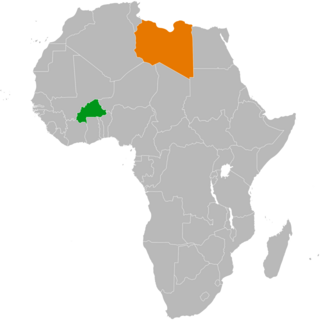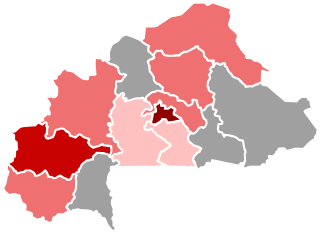Related Research Articles

Burkina Faso is a landlocked country in West Africa with an area of 274,200 km2 (105,900 sq mi), bordered by Mali to the northwest, Niger to the northeast, Benin to the southeast, Togo and Ghana to the south, and the Ivory Coast to the southwest. As of 2021, the country had an estimated population of 20,321,378. Previously called Republic of Upper Volta (1958–1984), it was renamed Burkina Faso by President Thomas Sankara. Its citizens are known as Burkinabès, and its capital and largest city is Ouagadougou. Its name is often translated into English as the "Land of Honest Men".

Michel Kafando is a Burkinabé diplomat who served as the transitional President of Burkina Faso from 2014 to 2015. He served in the government as Minister of Foreign Affairs from 1982 to 1983 and was the Permanent Representative (Ambassador) of Burkina Faso to the United Nations from 1998 to 2011.

The following outline is provided as an overview of and topical guide to Burkina Faso:

Céline Yoda is a Burkinabé politician. She was the ambassador of Burkinabe in Taiwan (R.O.C) from 2013-2017.

Yéro Boly is a Burkinabé politician and diplomat. He served in the government of Burkina Faso as Minister of Territorial Administration and Security from 1995 to 2000 and was Director of the Cabinet of the President from 2000 to 2004. Subsequently, he was Minister of Defense to 2004 to 2011 and Ambassador to Morocco from 2012 to 2015.

Burkina Faso–Russia relations are the bilateral relations between the two countries, Burkina Faso and Russia. Diplomatic relations between Burkina Faso and the Soviet Union were established for the first time on February 18, 1967. After the breakup of the Soviet Union, Burkina Faso recognized Russia as the USSR's successor. However financial reasons has shut the embassies between the two nations. In 1992, the embassy of the Russian Federation in Ouagadougou was closed, and in 1996, the embassy of Burkina Faso in Moscow was closed. Burkina Faso has since re-opened its embassy in Moscow. Russia is accredited to Burkina Faso from its embassy in Abidjan.

Human rights in Burkina Faso are addressed in its constitution, which was ratified in 1991. The 2009 Human Rights Report by the United States Department of State noted concerns regarding restrictions on the press and the operation of the judiciary system. In its 2021 report, Human Rights Watch described the human rights situation in Burkina Faso as being "precarious" in light of ongoing violence committed by Islamists, government security forces, and pro-government militias.

Yacouba Isaac Zida is a Burkinabé military officer who briefly served as Burkina Faso's acting head of state in November 2014. He took power in the aftermath of the 2014 Burkinabé uprising, sidelining a more senior officer, Honoré Nabéré Traoré. A few weeks later, a civilian, Michel Kafando, was chosen to replace Zida as transitional head of state; Kafando then appointed Zida as Prime Minister on 19 November 2014.

Burkina Faso–Libya relations refers to the current and historical relationship between Libya and Burkina Faso. Libya maintains an embassy in the Burkinabé capital of Ouagadougou, and Burkina Faso has an embassy in the Libyan capital of Tripoli.
The 2003 Burkina Faso coup d'état attempt was an alleged plot in the landlocked African country Burkina Faso that took place in October 2003. The attempted coup was carried out against long-time strongman President Blaise Compaoré and his CDP regime, and resulted in the imprisonment of several members of the military and political dissidents. Over a decade later, Compaoré would finally be overthrown in the 2014 Burkina Faso uprising.

Rosine Sori-Coulibaly is a Burkinabé economist and politician. She served as the minister of foreign affairs from 2021 to 2022. After being in the running to become the prime minister of Burkina Faso, she served as the minister of economy, finance and development from 2016 to 2019.

Burkina Faso–India relations refers to the international relations that exist between Burkina Faso and India. Burkina Faso maintains an embassy in New Delhi. India maintained an embassy in Ouagadougou from November 1996 until its closure in July 2002. Currently, India maintains an honorary consulate in Ouagadougou, which functions under the jurisdiction of the High Commission of India in Accra, Ghana.

On 2 March 2018, at least eight heavily armed militants launched an assault on key locations throughout Ouagadougou, the capital city of Burkina Faso. Targets included the French embassy and the headquarters of Burkina Faso's military.

On 19 January 2019, the government of Burkina Faso dissolved due to the resignation of Prime Minister Paul Kaba Thieba and all members of his cabinet. President of Burkina Faso Roch Marc Christian Kaboré announced that he intends to form a new government; on 21 January, he began the process of appointing a new government by naming Christophe Joseph Marie Dabiré as the new Prime Minister, but his cabinet remains vacant. In the days leading up to the resignation of the government, the country faced a number of attacks from militant terrorist groups, and opposition members of government had previously called for the prime minister and defense ministries to step down, citing an inability to address terrorist attacks.

The COVID-19 pandemic in Burkina Faso was a part of the ongoing worldwide pandemic of coronavirus disease 2019 caused by severe acute respiratory syndrome coronavirus 2. The virus was confirmed to have reached Burkina Faso on 9 March 2020. The death of Rose Marie Compaoré, a member of the National Assembly of Burkina Faso, on 18 March marked the first recorded fatality due to COVID-19 in Sub-Saharan Africa.

Burkina Faso–Turkey relations are the foreign relations between Burkina Faso and Turkey. Turkey and Burkina Faso enjoy strong and friendly bilateral relations. Bilateral relations gained momentum after the opening of the Turkish Embassy in Ouagadougou and the Embassy of Burkina Faso in Ankara in 2012 and in 2014 respectively.

A coup d'état was launched in Burkina Faso on 23 January 2022. Gunfire erupted in front of the presidential residence in the Burkinabé capital Ouagadougou and several military barracks around the city. Soldiers were reported to have seized control of the military base in the capital. However, the government denied there was an ongoing coup in the country. Several hours later, President Roch Marc Christian Kaboré was reported to have been detained by the soldiers at the military camp in the capital. On 24 January, the military announced on television that Kaboré had been deposed from his position as president. After the announcement, the military declared that the parliament, government and constitution had been dissolved. The coup d'état was led by military officer Paul-Henri Sandaogo Damiba.

Olivia Ragnaghnewendé Rouamba is a Burkina Faso politician who has been the nation's Minister of Foreign Affairs since March 2022.
References
- 1 2 "Koumbou Boly Barry". Office of the United Nations Human Rights Commissioner.
- ↑ "ICAO Council President receives Prime Minister of Burkina Faso". ALN News. 18 June 2014.